北师大版(2019)必修 第三册Unit 7 Art Writing Workshop 语言点课件(共18张ppt)
文档属性
| 名称 | 北师大版(2019)必修 第三册Unit 7 Art Writing Workshop 语言点课件(共18张ppt) | 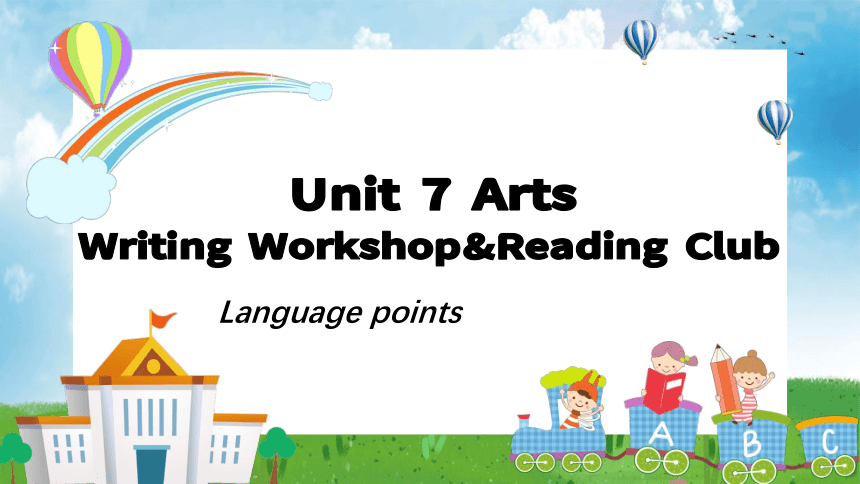 | |
| 格式 | pptx | ||
| 文件大小 | 40.8MB | ||
| 资源类型 | 教案 | ||
| 版本资源 | 北师大版(2019) | ||
| 科目 | 英语 | ||
| 更新时间 | 2023-10-09 20:52:22 | ||
图片预览

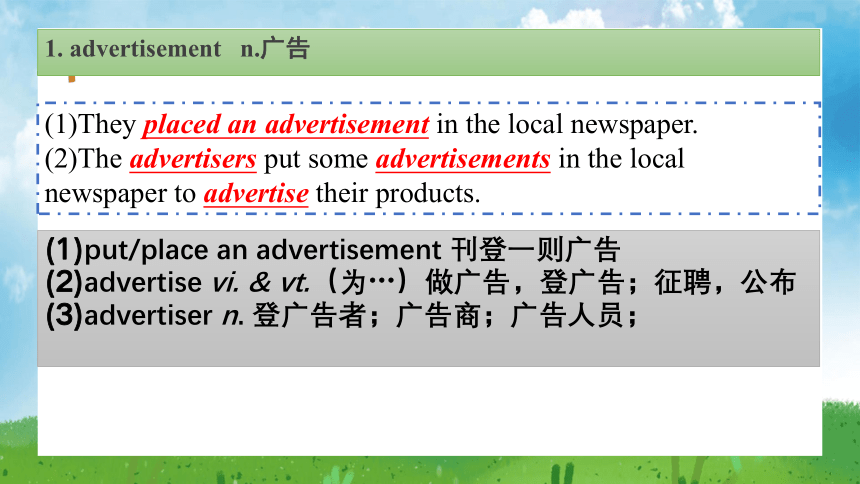
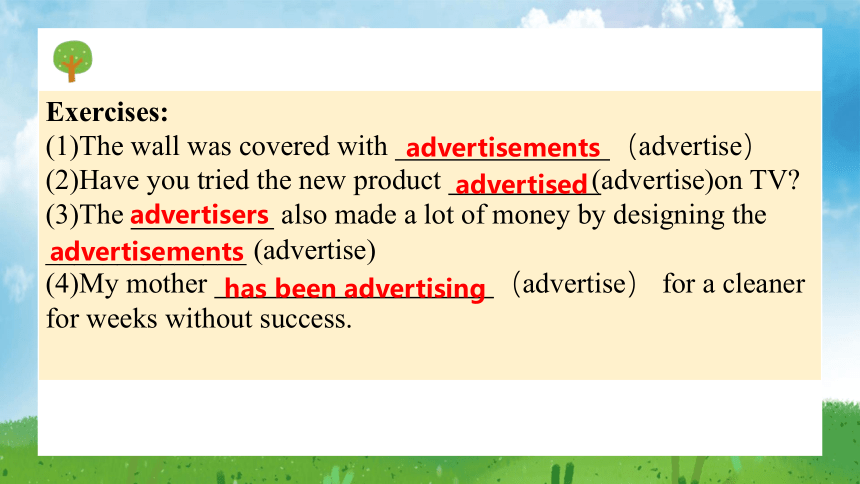
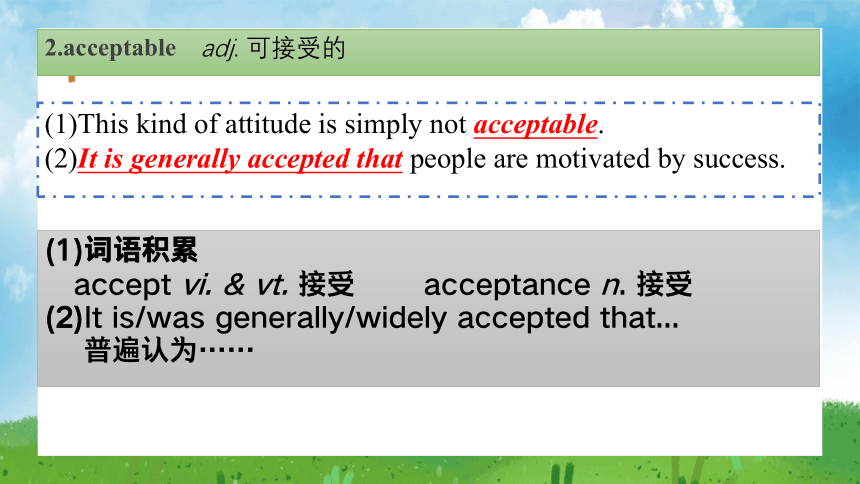
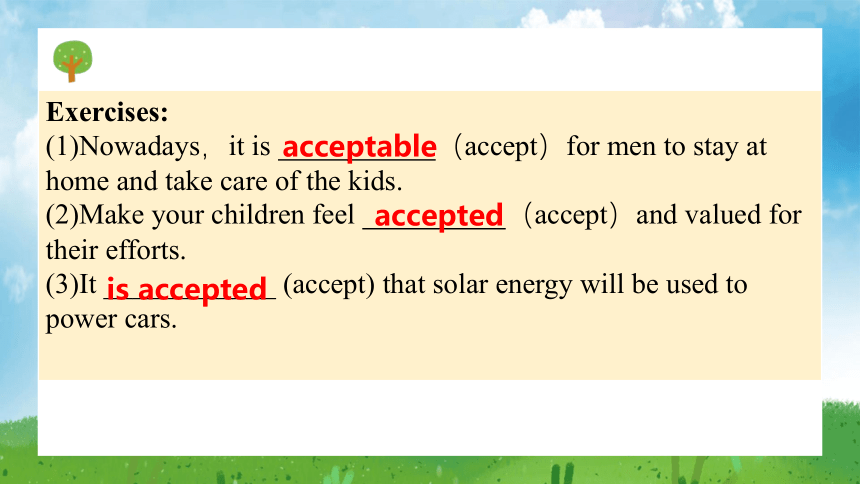
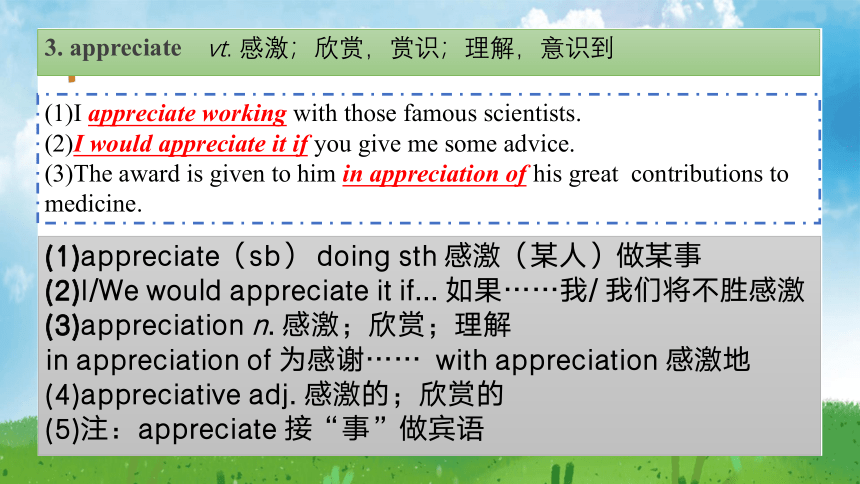
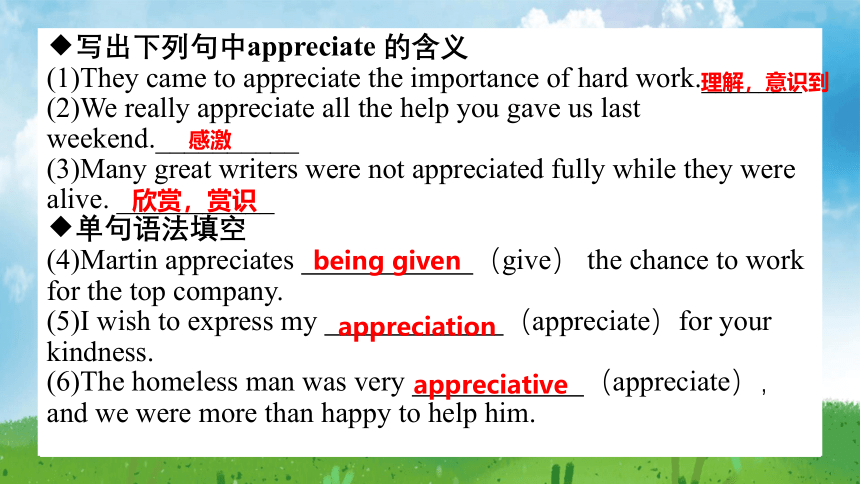
文档简介
(共18张PPT)
Unit 7 Arts
Writing Workshop&Reading Club
Language points
1. advertisement n.广告
(1)They placed an advertisement in the local newspaper.
(2)The advertisers put some advertisements in the local newspaper to advertise their products.
(1)put/place an advertisement 刊登一则广告
(2)advertise vi. & vt.(为…)做广告,登广告;征聘,公布
(3)advertiser n. 登广告者;广告商;广告人员;
Exercises:
(1)The wall was covered with (advertise)
(2)Have you tried the new product (advertise)on TV
(3)The also made a lot of money by designing the ______________ (advertise)
(4)My mother (advertise) for a cleaner for weeks without success.
advertisements
advertised
advertisers
advertisements
has been advertising
2.acceptable adj. 可接受的
(1)This kind of attitude is simply not acceptable.
(2)It is generally accepted that people are motivated by success.
(1)词语积累
accept vi. & vt. 接受 acceptance n. 接受
(2)It is/was generally/widely accepted that...
普遍认为……
Exercises:
(1)Nowadays,it is (accept)for men to stay at home and take care of the kids.
(2)Make your children feel (accept)and valued for their efforts.
(3)It ____________ (accept) that solar energy will be used to power cars.
acceptable
accepted
is accepted
3. appreciate vt. 感激;欣赏,赏识;理解,意识到
(1)I appreciate working with those famous scientists.
(2)I would appreciate it if you give me some advice.
(3)The award is given to him in appreciation of his great contributions to medicine.
(1)appreciate(sb) doing sth 感激(某人)做某事
(2)I/We would appreciate it if... 如果……我/ 我们将不胜感激
(3)appreciation n. 感激;欣赏;理解
in appreciation of 为感谢…… with appreciation 感激地
(4)appreciative adj. 感激的;欣赏的
(5)注:appreciate 接“事”做宾语
◆写出下列句中appreciate 的含义
(1)They came to appreciate the importance of hard work._______
(2)We really appreciate all the help you gave us last weekend.__________
(3)Many great writers were not appreciated fully while they were alive. ___________
◆单句语法填空
(4)Martin appreciates (give) the chance to work for the top company.
(5)I wish to express my (appreciate)for your kindness.
(6)The homeless man was very (appreciate),and we were more than happy to help him.
理解,意识到
感激
欣赏,赏识
being given
appreciation
appreciative
4. expressive adj. 富于感情的;明确表露想法的
(1)The final movement of Beethoven’s Symphony No. 9 is expressive of joy.
(2)Alice can express herself in simple Chinese.
(3)You should give expressions to your feelings in your speech.
(4)The beauty of the West Lake is entirely beyond expression.
(1)be expressive of 体现出(某种感情)
(2)express vt. 表达,表示
express oneself 表达自己的想法/ 感情
(3)expression n. 表达,表示,表露;表情,神色
give expression to 表达……
beyond expression 无法表达
◆单句语法填空
(1)She has (express)eyes,and many people are attracted by them.
(2)The (express) on his face suggested that the performance was a great success.
(3)—Oh,you sounded just like a native.
— Well,not quite. I still have trouble (express)myself.
(4)She has a good command of English and she has no difficulty in expressing (she)in English.
expressive
expression
expressing
herself
5. admiration n. 敬佩,钦佩;羡慕
(1)The public have great admiration for those great scientists.
(2)That girl stared at the well-known composer in admiration.
(3)I admire him for his bravery.
(1)have great admiration for 十分钦佩……
(2)in admiration 钦佩地
(3)admire vt. 钦佩;羡慕;欣赏
admire sb for (doing) sth 因某事而钦佩/羡慕某人 (4)admirable adj. 令人钦佩的,令人羡慕的
◆单句语法填空
(1)The public are full of (admire)for the hard work of those doctors and nurses.
(2)All the children stood there,watching the pianist admiration.
(3)As a matter of fact,what he has done is really (admire).
(4)We all admire Dr. Yuan Longping his great contributions to agriculture.
admiration
in
admirable
for
5. permission n. 允许,许可
(1)You must ask for permission before taking photographs inside the hall.
(2)Our school doesn’t permit smoking.
(3)His mother permitted him to attend his friend’s birthday party.
(1)ask for permission 请求许可
get/obtain permission 获得许可
without permission 未经允许
(2)permit vt. 允许,准许,许可 n. 许可证
permit doing sth 允许做某事
permit sb to do sth 允许某人做某事
weather/time permitting 如果天气/ 时间允许的话
◆单句语法填空
(1)It’s strange that he should have taken the books without the owner’s ___________ (permit).
(2)Electrical equipment shouldn’t be touched our teacher’s permission.
(3)He doesn’t permit (touch) his computer.
(4)They don’t permit us (park)here.
(5)Time (permit),I will go to the British Museum.
permission
without
touching
to park
permitting
6. threatening adj. (行为)带有威胁的,恐吓的
(1)His voice sounded threatening.
(2)They threaten to cancel the whole project
(3)The whole city is under threat from air pollution.
(1)a threatening letter一封恐吓信
(2)threaten vt. 威胁,恐吓;威胁到,危及
threaten to do sth 威胁要做某事
(3)threat n. 威胁,恐吓
under threat (from...)受到(……带来的)威胁
◆单句语法填空
(1)The police could have charged them with (threaten)behaviour.
(2)The cabs running too fast on the road (threat)people’s safety.
(3)David threatened (report)his neighbour to the police if the damages were not paid.
(4)A weak economy has led to poverty and severe famine ___________ (threaten) millions of people.
threatening
threaten
to report
threatening
7.It is believed that graffiti in its modern form first became popular in the United States in the 1960s.
(1)It is believed that... 人们认为……
(2)It + be + 过去分词 + that...
It is agreed that... 人们同意…It is argued that... 人们主张……
It is hoped that... 人们希望…It is said that... 据说……
It is recorded that... 据记载…It is reported that... 据报道……
It is announced that... 据宣布…It is thought that... 人们认为…
It is suggested that... 有人建议……
人们认为现代形式的涂鸦是20 世纪60 年代在美国首次开始流行起来的。
注:该句式可以转换为“sb/sth + be+ 过去分词+ 不定式”和“People +动词 + that... ”
◆单句语法填空
(1)It is believed the early settlers brought a lot of words for food.
(2) is thought that the plot of the drama is very entertaining.
(3)It has been proved eating vegetables in childhood helps to protect you against serious illnesses in later life.
(4)It is suggested we should hold an exhibition for the old artist.
that
It
that
that
THANKS!
Unit 7 Arts
Writing Workshop&Reading Club
Language points
1. advertisement n.广告
(1)They placed an advertisement in the local newspaper.
(2)The advertisers put some advertisements in the local newspaper to advertise their products.
(1)put/place an advertisement 刊登一则广告
(2)advertise vi. & vt.(为…)做广告,登广告;征聘,公布
(3)advertiser n. 登广告者;广告商;广告人员;
Exercises:
(1)The wall was covered with (advertise)
(2)Have you tried the new product (advertise)on TV
(3)The also made a lot of money by designing the ______________ (advertise)
(4)My mother (advertise) for a cleaner for weeks without success.
advertisements
advertised
advertisers
advertisements
has been advertising
2.acceptable adj. 可接受的
(1)This kind of attitude is simply not acceptable.
(2)It is generally accepted that people are motivated by success.
(1)词语积累
accept vi. & vt. 接受 acceptance n. 接受
(2)It is/was generally/widely accepted that...
普遍认为……
Exercises:
(1)Nowadays,it is (accept)for men to stay at home and take care of the kids.
(2)Make your children feel (accept)and valued for their efforts.
(3)It ____________ (accept) that solar energy will be used to power cars.
acceptable
accepted
is accepted
3. appreciate vt. 感激;欣赏,赏识;理解,意识到
(1)I appreciate working with those famous scientists.
(2)I would appreciate it if you give me some advice.
(3)The award is given to him in appreciation of his great contributions to medicine.
(1)appreciate(sb) doing sth 感激(某人)做某事
(2)I/We would appreciate it if... 如果……我/ 我们将不胜感激
(3)appreciation n. 感激;欣赏;理解
in appreciation of 为感谢…… with appreciation 感激地
(4)appreciative adj. 感激的;欣赏的
(5)注:appreciate 接“事”做宾语
◆写出下列句中appreciate 的含义
(1)They came to appreciate the importance of hard work._______
(2)We really appreciate all the help you gave us last weekend.__________
(3)Many great writers were not appreciated fully while they were alive. ___________
◆单句语法填空
(4)Martin appreciates (give) the chance to work for the top company.
(5)I wish to express my (appreciate)for your kindness.
(6)The homeless man was very (appreciate),and we were more than happy to help him.
理解,意识到
感激
欣赏,赏识
being given
appreciation
appreciative
4. expressive adj. 富于感情的;明确表露想法的
(1)The final movement of Beethoven’s Symphony No. 9 is expressive of joy.
(2)Alice can express herself in simple Chinese.
(3)You should give expressions to your feelings in your speech.
(4)The beauty of the West Lake is entirely beyond expression.
(1)be expressive of 体现出(某种感情)
(2)express vt. 表达,表示
express oneself 表达自己的想法/ 感情
(3)expression n. 表达,表示,表露;表情,神色
give expression to 表达……
beyond expression 无法表达
◆单句语法填空
(1)She has (express)eyes,and many people are attracted by them.
(2)The (express) on his face suggested that the performance was a great success.
(3)—Oh,you sounded just like a native.
— Well,not quite. I still have trouble (express)myself.
(4)She has a good command of English and she has no difficulty in expressing (she)in English.
expressive
expression
expressing
herself
5. admiration n. 敬佩,钦佩;羡慕
(1)The public have great admiration for those great scientists.
(2)That girl stared at the well-known composer in admiration.
(3)I admire him for his bravery.
(1)have great admiration for 十分钦佩……
(2)in admiration 钦佩地
(3)admire vt. 钦佩;羡慕;欣赏
admire sb for (doing) sth 因某事而钦佩/羡慕某人 (4)admirable adj. 令人钦佩的,令人羡慕的
◆单句语法填空
(1)The public are full of (admire)for the hard work of those doctors and nurses.
(2)All the children stood there,watching the pianist admiration.
(3)As a matter of fact,what he has done is really (admire).
(4)We all admire Dr. Yuan Longping his great contributions to agriculture.
admiration
in
admirable
for
5. permission n. 允许,许可
(1)You must ask for permission before taking photographs inside the hall.
(2)Our school doesn’t permit smoking.
(3)His mother permitted him to attend his friend’s birthday party.
(1)ask for permission 请求许可
get/obtain permission 获得许可
without permission 未经允许
(2)permit vt. 允许,准许,许可 n. 许可证
permit doing sth 允许做某事
permit sb to do sth 允许某人做某事
weather/time permitting 如果天气/ 时间允许的话
◆单句语法填空
(1)It’s strange that he should have taken the books without the owner’s ___________ (permit).
(2)Electrical equipment shouldn’t be touched our teacher’s permission.
(3)He doesn’t permit (touch) his computer.
(4)They don’t permit us (park)here.
(5)Time (permit),I will go to the British Museum.
permission
without
touching
to park
permitting
6. threatening adj. (行为)带有威胁的,恐吓的
(1)His voice sounded threatening.
(2)They threaten to cancel the whole project
(3)The whole city is under threat from air pollution.
(1)a threatening letter一封恐吓信
(2)threaten vt. 威胁,恐吓;威胁到,危及
threaten to do sth 威胁要做某事
(3)threat n. 威胁,恐吓
under threat (from...)受到(……带来的)威胁
◆单句语法填空
(1)The police could have charged them with (threaten)behaviour.
(2)The cabs running too fast on the road (threat)people’s safety.
(3)David threatened (report)his neighbour to the police if the damages were not paid.
(4)A weak economy has led to poverty and severe famine ___________ (threaten) millions of people.
threatening
threaten
to report
threatening
7.It is believed that graffiti in its modern form first became popular in the United States in the 1960s.
(1)It is believed that... 人们认为……
(2)It + be + 过去分词 + that...
It is agreed that... 人们同意…It is argued that... 人们主张……
It is hoped that... 人们希望…It is said that... 据说……
It is recorded that... 据记载…It is reported that... 据报道……
It is announced that... 据宣布…It is thought that... 人们认为…
It is suggested that... 有人建议……
人们认为现代形式的涂鸦是20 世纪60 年代在美国首次开始流行起来的。
注:该句式可以转换为“sb/sth + be+ 过去分词+ 不定式”和“People +动词 + that... ”
◆单句语法填空
(1)It is believed the early settlers brought a lot of words for food.
(2) is thought that the plot of the drama is very entertaining.
(3)It has been proved eating vegetables in childhood helps to protect you against serious illnesses in later life.
(4)It is suggested we should hold an exhibition for the old artist.
that
It
that
that
THANKS!
同课章节目录
- Unit 7 Art
- Lesson 1 Masterpieces
- Lesson 2 Beijing Opera
- Lesson 3 A Musical Genius
- Unit 8 Green living
- Lesson 1 Roots and Shoots
- Lesson 2 Greening the Desert
- Lesson 3 "White Bikes" on the Road
- Unit 9 Learning
- Lesson 1 Active Learning
- Lesson 2 Language Learning Tips
- Lesson 3 The Secrets of Your Memory
